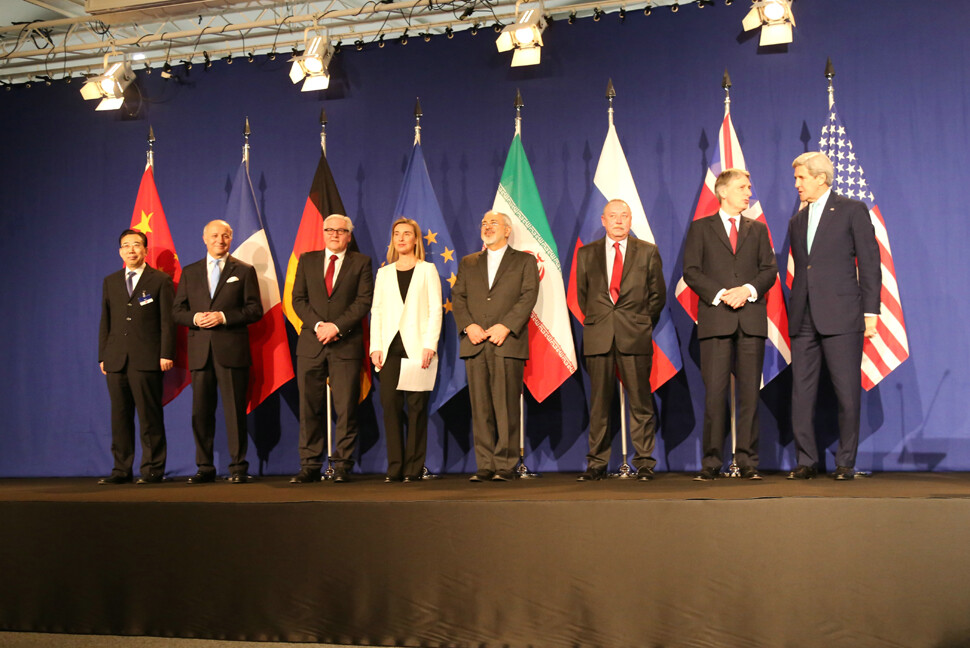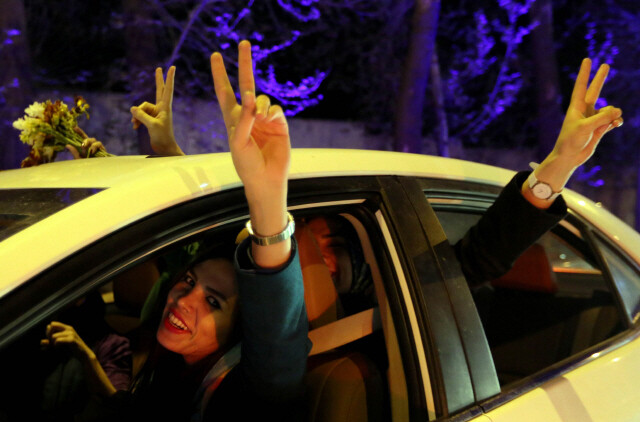hankyoreh
Links to other country sites 다른 나라 사이트 링크
[Editorial] After Iran agreement, Seoul must lead on N. Korea nuke dialogue efforts

On Apr. 2, the US and five other major countries, known as P5+1, reached an agreement with Iran about its nuclear program, which has been one of the most intractable problems faced by the international community for the past 10 years. The agreement represents the fruit of patient efforts by the international community to enforce the non-proliferation regime for nuclear weapons.
If the details can be hashed out by the end of June - and if the agreement is implemented effectively - it is expected to be beneficial for politics in the Middle East and for the global economy. South Korea’s neighbors should also work together to ensure that this agreement has a positive effect on the issue of North Korea’s nuclear program.
The main point of this comprehensive framework for joint action, as it is called, is to significantly limit Iran’s nuclear capacity for at least the next 10 years while also removing in stages the international community’s sanctions against Iran.
Presuming that the agreement is implemented, it would block Iran from acquiring the nuclear material it would need to make nuclear weapons for a year, even if it decided to acquire such weapons. Guaranteeing that the international community has enough time to counter such efforts keeps Iran accountable.
While the agreement permits Iran to research and develop nuclear technology, this must be monitored by the International Atomic Energy Agency (IAEA). The agreement is reasonable since it permits the peaceful use of nuclear technology within the framework of nonproliferation. In addition, the agreement is being welcomed by most countries around the world.
The resolve of US President Barack Obama and moderate Iranian President Hassan Rouhani went a long way toward making this agreement a reality. At the beginning of his first term in early 2009, Obama said that he would shake hands with the enemy, referring to the three countries of North Korea, Cuba, and Iran.
While leading the negotiating body known as P5+1, which includes the five permanent members of the UN Security Council and Germany, the US also held bilateral meetings with Iran from time to time.
US Secretary of State John Kerry extended the deadline twice and reached a last-minute breakthrough on points of disagreement during a meeting with Iranian Foreign Minister Mohammad Javad Zarif.
We hope that the two countries will have the wisdom to resist a backlash from Middle Eastern countries such as Israel and from hardliners at home.
If the agreement fails to be ratified by the legislatures of the two countries, it is sure to complicate the implementation of the agreement. Such a development would likely also destabilize the situation in the Middle East.

There are a variety of predictions about how this agreement will affect the North Korean nuclear issue. While some think that it will reinforce efforts to find a solution through dialogue, many others emphasize that North Korea is different from Iran since it has already carried out three nuclear weapons tests. Still others argue that, with only one and a half years left before Obama leaves office, he does not have enough momentum to launch full-scale negotiations about North Korea’s nuclear program.
But the important thing is resolve. The agreement shows that the US can solve difficult problems if it just sets its mind to it. If the Obama administration had put even half of the effort it has spent tackling the Iran nuclear issue into the issue of North Korea’s nuclear weapons, the situation would be much different.
Time is not a major problem, either. Negotiators need not start from scratch; there are frameworks that can be used immediately, including the Sep. 19 Joint Statement and the six-party talks. Talks with North Korea would also help Obama keep his promise to shake hands with the enemy.
The South Korean government needs to make every effort to ensure that this framework leads to an agreement on North Korea’s nuclear program.
The countries of Europe contributed greatly to creating the mood for dialogue between the US and Iran. Since South Korea is directly involved with North Korea’s nuclear program, it goes without saying that it should play an even greater role.
Please direct questions or comments to [english@hani.co.kr]

Editorial・opinion
![[Column] Park Geun-hye déjà vu in Yoon Suk-yeol [Column] Park Geun-hye déjà vu in Yoon Suk-yeol](https://flexible.img.hani.co.kr/flexible/normal/500/300/imgdb/original/2024/0424/651713945113788.jpg) [Column] Park Geun-hye déjà vu in Yoon Suk-yeol
[Column] Park Geun-hye déjà vu in Yoon Suk-yeol![[Editorial] New weight of N. Korea’s nuclear threats makes dialogue all the more urgent [Editorial] New weight of N. Korea’s nuclear threats makes dialogue all the more urgent](https://flexible.img.hani.co.kr/flexible/normal/500/300/imgdb/original/2024/0424/7317139454662664.jpg) [Editorial] New weight of N. Korea’s nuclear threats makes dialogue all the more urgent
[Editorial] New weight of N. Korea’s nuclear threats makes dialogue all the more urgent- [Guest essay] The real reason Korea’s new right wants to dub Rhee a founding father
- [Column] ‘Choson’: Is it time we start referring to N. Korea in its own terms?
- [Editorial] Japan’s rewriting of history with Korea has gone too far
- [Column] The president’s questionable capacity for dialogue
- [Column] Are chaebol firms just pizza pies for families to divvy up as they please?
- [Column] Has Korea, too, crossed the Rubicon on China?
- [Correspondent’s column] In Japan’s alliance with US, echoes of its past alliances with UK
- [Editorial] Does Yoon think the Korean public is wrong?
Most viewed articles
- 1[Column] Park Geun-hye déjà vu in Yoon Suk-yeol
- 2Thursday to mark start of resignations by senior doctors amid standoff with government
- 3Will NewJeans end up collateral damage in internal feud at K-pop juggernaut Hybe?
- 4[Guest essay] The real reason Korea’s new right wants to dub Rhee a founding father
- 5Why Korea shouldn’t welcome Japan’s newly beefed up defense cooperation with US
- 6[Editorial] New weight of N. Korea’s nuclear threats makes dialogue all the more urgent
- 7Kim Jong-un expressed ‘satisfaction’ with nuclear counterstrike drill directed at South
- 8[Column] ‘Choson’: Is it time we start referring to N. Korea in its own terms?
- 9N. Korean hackers breached 10 defense contractors in South for months, police say
- 10‘We must say no’: Seoul defense chief on Korean, USFK involvement in hypothetical Taiwan crisis